| 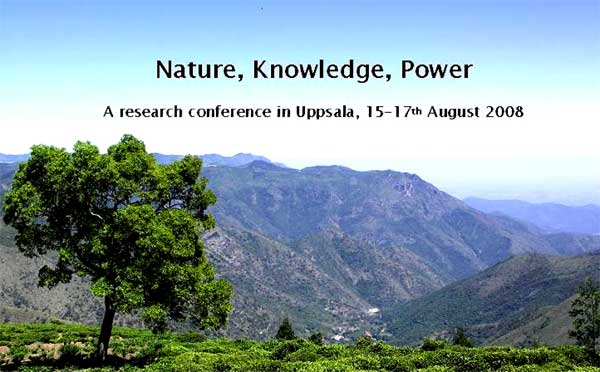
The international research conference “Nature, Knowledge, Power” was held in Uppsala 15-17 August 2008. SASNET was the main funder and organiser, while FORMAS and DevNet at the Centre for Sustainable Development, Uppsala University contributed with grants.
The conference brought together researchers from different academic fields, concerned with questions of environment and society under present and historical conditions. About forty researchers and research students equally from South Asian and European universities participated in the conference and 25 full research papers were presented papers within five panels: “Energy: renewable and sustainable?”, “Competing rights, codifying law”, “Community rights under neoliberal rule”, “Who needs conservation? Nature, people, survival”, and “Ideologies of environmental change: from imperial modernization to postcolonial social equality?” – more information below.
The conference had two keynote speakers: Amita Baviskar from the Institute of Economic Growth at Delhi University, India and Arun Agrawal, University of Michigan.
The event was hosted by the Department of Urban and Rural Development at the Swedish University of Agricultural Science at Ultuna (SLU), and the proceedings were held in beautiful surroundings at Ultuna, a few miles outside of Uppsala.
The conference successfully brought together researchers with a variety of perspectives in a sharing environment during a few intense days. At the conference, an inter-disciplinary network of researchers focusing on South Asian environmental issues began to emerge. SASNET will work to find ways to let this network materialize within its own activities.
Sessions
1. Energy: renewable and sustainable?
The enormous problems connected with fossil fuels, being a finite
resource causing green house gases and global warming, are today well
documented. Energy efficiency needs to be increased and renewable
resources further developed and used (the latter accounting for a
meagre 13 percent of global energy production). Developing renewable
energy sources is on the one hand a technical question but whether or
not it will be used depends on political and social decisions, thus
having social and political implications. With India's rapid economic
growth coupled by environmental degradation, energy conversion and use
is gradually moving to the forefront of political agendas in South
Asia. Among the questions addressed by this panel were: Experiences of
renewable energy in South Asia – pros and cons? Power struggles over
energy? How sustainable are energy sources such as bio-fuels? Social
movements pro or against renewable energy?
Panel convener: Hans Blomkvist
2. Competing rights, codifying law
Equal as citizens and equal under the law is a hallmark of modern states but the last two hundred years of South Asian history gives numerous examples of how legal regulations and the making of legal codes have become part of conflicts over land and resources. Terminology and classification such as 'tribe', 'pastoralist' and 'primitive' have been reflected in legal terminology and codification of rights in nature thus questioning the universality of law in relation to subjects and citizens. This session targeted the relationship between humans (citizens, subjects) and nature as it was and still is legally configured and codified in areas where the ecology is under pressure and competition for resources is high. The session welcomed both historical and present day situations where the making and working of law is central to the conflict. The disputed key questions of early colonial rule are significant also for present conflicts—not least in relation to property, access, or acquisition of land—i.e. those of sovereignty, public good, aboriginal right, wasteland, etc.
Panel convener: Gunnel Cederlöf &
Arun Bandopadhyay
3. Community rights under neoliberal rule
The hegemony of neoliberal policy, coupling economic liberalisation and a shrinking state, has reconstituted the place of communities in terms of ownership and control of natural resources. On the one hand, community rights seem to have been strengthened, not least through the involvement of various non-state actors advocating community management and traditional ecological knowledge as a means to secure forest and biodiversity conservation. But, on the other, the community resource base is also under great pressure from increased market penetration with privatisation and commodification of nature. In this panel, we sought to probe the new conditions under which community rights are being negotiated today.
Panel convener: Beppe Karlsson
4. Who needs conservation? Nature, people, survival
The protection of nature and human livelihoods has tended to come into conflict over the last 200 years. The divide between preservation and sustainable use is still often paralleled by a rift between social and natural science-based approaches to conservation. This session sought to address issues of vulnerable ecologies and cultures under pressure of rapid change. Governments' solutions have for a long time included measures of excluding people for the sake of nature. Looking at the result of the last decades of participatory and community based management policies reveals their interrelationship to the democratic depth of such policies. The historic dimension is crucial. Conservation policies are the outcome of specific moments in human history.
Panel convener: Karin Gerhardt
5. Ideologies of environmental change:
from imperial modernization to postcolonial social equality?
Understanding planned changes of rural and urban environments as closely linked to strategies of rule, implies taking seriously how these changes relate to historically formed notions such as 'progress', 'discipline' and 'freedom'. Asking to what extent colonial visions of modernization of South Asian societies and economies continued in independent environmental policy on the Subcontinent, this panel invites papers dealing with continuity and change in the intellectual history of environmental change in South Asia. The session aimed to explore topics such as: manifestations of national/communal identities in nature ; discipline and the making of landscapes; planned environments as utopias.
Panel convener: Mahesh Rangarajan
Keynote speakers
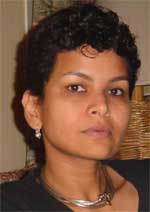 Dr. Amita Baviskar, Reader at the Institute of Economic Growth, Delhi University is a sociologist, specialising in large dam projects and the subsequent displacement of people; urban environments and the urban poor. Her recent major publications include: Dr. Amita Baviskar, Reader at the Institute of Economic Growth, Delhi University is a sociologist, specialising in large dam projects and the subsequent displacement of people; urban environments and the urban poor. Her recent major publications include:
Waterscapes - The Cultural Politics of Natural Resources (Permanent Black, 2007).
Untouchability in Rural India, with Ghanshyam Shah, Harsh Mander, Sukhdeo Thorat, Satish Deshpande (Sage Publications, 2006)
In the Belly of the River: Tribal Conflicts over Development in the Narmada Valley (Oxford University Press, second edition, 2004)
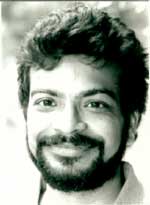 Dr. Arun Agrawal, Associate Professor in Natural Resources and Environment at the University of Michigan, researches the politics of international development and environmental conservation, with a focus on institutional change, property rights, poverty, and biodiversity. He has published on several topics including indigenous knowledge, population and resources, and environmental identities. Recent interests include the decentralization of environmental policy. His publications include: Dr. Arun Agrawal, Associate Professor in Natural Resources and Environment at the University of Michigan, researches the politics of international development and environmental conservation, with a focus on institutional change, property rights, poverty, and biodiversity. He has published on several topics including indigenous knowledge, population and resources, and environmental identities. Recent interests include the decentralization of environmental policy. His publications include:
Environmentality: Technologies of Government and Political Subjects (Duke University Press, 2005).
The Future of Nomadic Agro-Pastoralism in South Asia, with Vasant Saberwal. Special issue, Nomadic Peoples (2005.).
Regional Modernities: The Cultural Politics of Development, with K. Sivaramakrishnan. (Stanford University Press 2003, and published jointly by Oxford University Press, New Delhi, 2003).
Programme
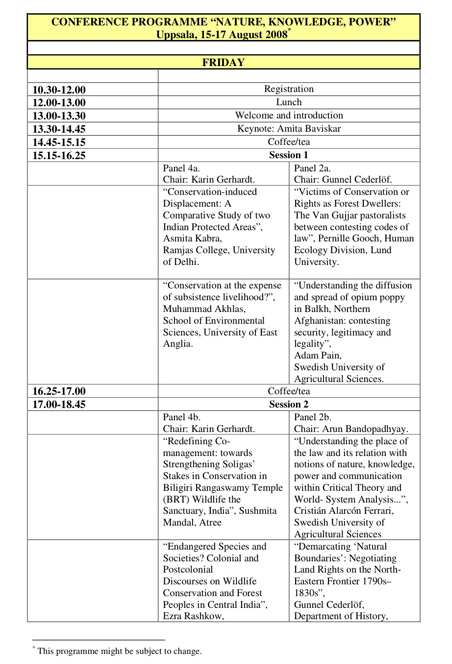 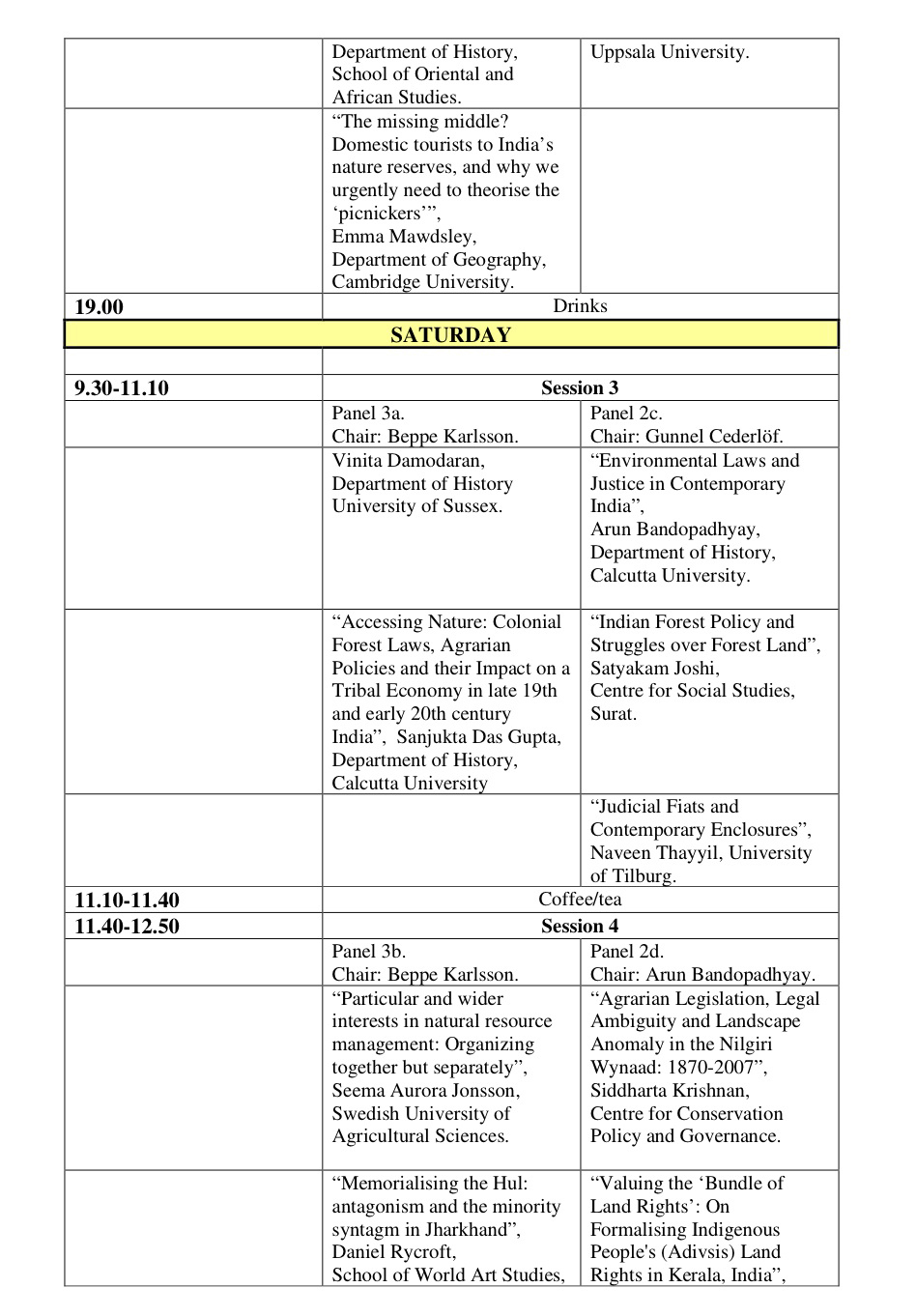
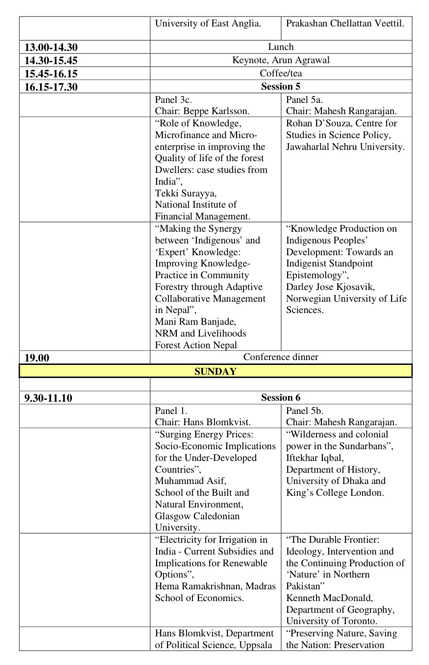

Conference committee and organisers:
• Daniel A. Bergquist, Dept. of Social and
Economic Geography, Uppsala Centre for
Sustainable Development (CSD)
• Hans Blomkvist, Assoc. Prof., Dept. of Government, Uppsala University
• Gunnel Cederlöf, Assoc. Prof., Dept. of History, Uppsala University, (chair)
• Karin Gerhard, Dr., Centre for Biodiversity, Uppsala University
• Anna Lindberg, Director, SASNET
• Adam Pain, Prof., Urban and Rural Development, Swedish Agricultural University,
Uppsala
• Sverker Sörlin, Prof., Division of History of Science and Technology, Royal Institute of
Technology, Stockholm
External advisors
• Ray Bryant, Prof., Kings College, London, UK
• Vinita Damodaran, Dr., Centre for World Environmental History, Sussex University, UK
• Mahesh Rangarajan, Prof., Delhi University, India
Conference administrator
• Henrik Chetan Aspengren
Information about the organizers
Nature, Knowledge, Power is jointly organised by the Swedish South Asian Studies Network (SASNET), the Department for Rural and Urban Development at the Swedish University for Agricultural Sciences (SLU), and Uppsala Centre for Sustainable Development (CSD).
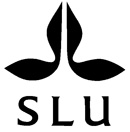 Swedish University for Agricultural Sciences/ Swedish University for Agricultural Sciences/
The Department of Urban and Rural Development.
The department was formed in January 2006 by the joining of the Department of Landscape Planning Ultuna (LPUL) and the Department of Rural Development and Agroecology (RDA). Research at the department focuses on sustainability in the relations between man and the environment and the sustainable use of natural resources. Research covers Europe and developing countries.
 Uppsala Centre for Sustainable Development (CSD) Uppsala Centre for Sustainable Development (CSD)
An inter-disciplinary centre for education and research on sustainable development, in collaboration between Uppsala University and the Swedish University of Agricultural Sciences (SLU) in Uppsala. CSD Uppsala aims to coordinate and stimulate education and research on sustainable development in the two universities, and provide an inspiring meeting place for critical dialogue on global survival issues between students, teachers, researchers and civil society.
 Swedish South Asian Studies Network (SASNET) Swedish South Asian Studies Network (SASNET)
A national network for research, education, and information about South Asia, based at Lund University. The aim is to encourage and promote an open and dynamic networking process, in which Swedish researchers co-operate with researchers in South Asia and globally. The network is open to all sciences. Priority is given to co-operation between disciplines and across faculties, as well as institutions in the Nordic countries and in South Asia.
|